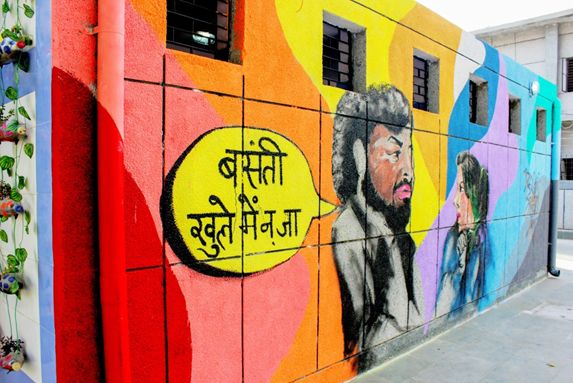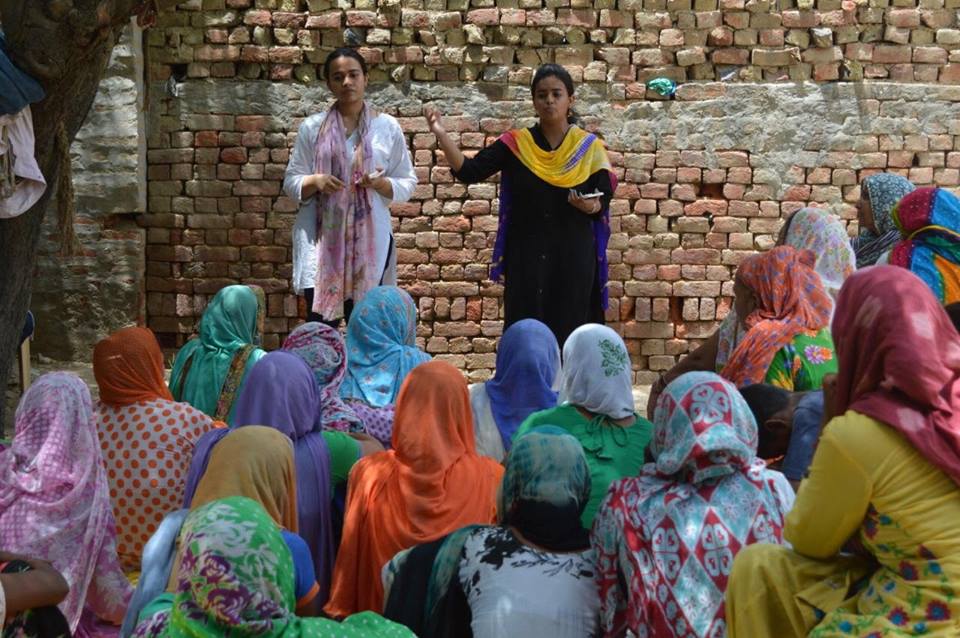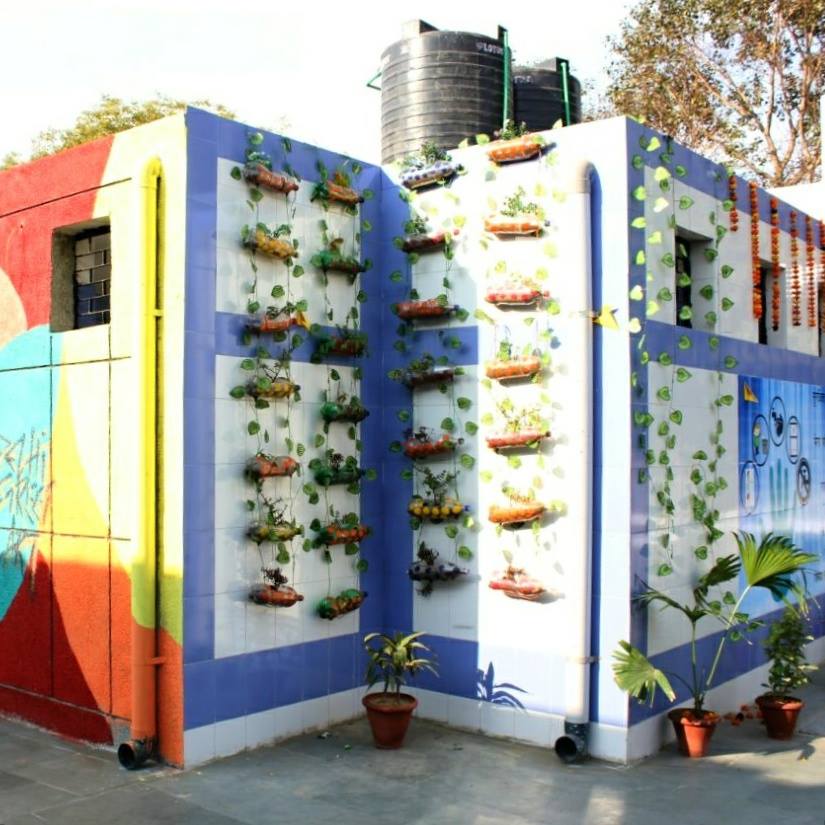Pramod Kumar Singh, the caretaker of a community toilet complex in northwest Delhi’s Sultanpuri area is proud about its upkeep. The complex, built by the Delhi Urban Shelter Improvement Board (DUSIB) and inaugurated in 2016, is well maintained with beautiful landscaping, posters and wall art.
Pramod has been looking after it for the last two-and-a-half years since he began working here. He works in close collaboration with young college students of Project Raahat, an initiative by students of a management institute, Shaheed Sukhdev College of Business Studies (SSCBS), Delhi University. The project is a part of Enactus, a global non-profit organisation run by students at university and college levels. Enactus uses innovative measures to sensitise people on healthy sanitation, develops business models for management and takes up aesthetic modification of toilet complexes.
Maintaining toilet complexes
 Soon after the DUSIB gave the responsibility of maintaining the complex in the Sultanpuri area in 2016 to Enactus SSCBS, they identified two people from the bordering slum community to take care of it—Pramod was appointed as the caretaker and Shakuntala Shukla as the cleaner. Pramod lives right across the complex making the upkeep of the toilet complex easy for him.
Soon after the DUSIB gave the responsibility of maintaining the complex in the Sultanpuri area in 2016 to Enactus SSCBS, they identified two people from the bordering slum community to take care of it—Pramod was appointed as the caretaker and Shakuntala Shukla as the cleaner. Pramod lives right across the complex making the upkeep of the toilet complex easy for him.
Pramod has been provided training in bookkeeping and data recording. Smart cleaning practices like the usage of organic cleaning materials and water saving methods like water saving pressure guns have been adopted. On duty during the daytime, Pramod feels that the cleanliness and the beauty of the complex have generated a desire among people to keep it clean and not deface it.
“The walls have vertical gardens where saplings have been planted in plastic bottles and hung on the outer walls of the toilet complex. There are no stinky or leaky toilets in the complex. After its inauguration, we mistook it for a school given its aesthetics,” says Rakesh Kumar, a toilet user who lives in the P-1 block of Sultanpuri.
Use business to transform
Enactus is committed to using the power of entrepreneurial action to transform lives and shape a better and more sustainable world. The Enactus SSCBS team comprises over 70 students and about 20 of them are directly involved in Project Raahat.

Estimates by the DUSIB suggest that in 2016, not more than 25 percent of people in the 700-odd slums in Delhi used household toilets. “Enactus SSCBS too conducted a need assessment survey in these slums at Sultanpuri to understand the community’s needs. Most people did not have household toilets in the Sultanpuri slums in 2016. Some of them had but women used them while men used the open grounds nearby to relieve themselves. The community toilets were in a poor condition with broken walls, no water and power supply and were particularly unsafe for women,” says Shreya Ghogar, an organising team member of Project Raahat. She began working on the project soon after joining the Bachelor course in Management Studies at SSCBS a year back.
In 2017, Enactus SSCBS approached the DUSIB for allocation of toilet complexes in some of the slums. As a result, Enactus has been allocated five toilet complexes and is working on monitoring another 45 complexes.
“At Sultanpuri, there is a sense of community accountability towards the maintenance of toilet complexes. This has been possible through several trainings that have been conducted at the toilet complex,” says Kuldeep, Shakuntala’s son who cleans the complex since she has taken ill.
We tried to penetrate the community through children. To generate interest in them, we created a superhero called ‘Raahi’, an epitome of cleanliness and painted him on one of the walls. This cartoon character serves as a visual shorthand that children can relate to. He inculcates better sanitation habits in them,” says Shreya.
“Enactus ran camps and involved children from the slum community to persuade adults to use the community toilet instead of defecating in the open. The backside of the toilet complex was used for conducting regular camps for all demographics (men, women and children) to encourage them to adopt better sanitary habits,” says Sushant Gautam, who lives in the C-6 block of Sultanpuri slum area.
Crossing financial hurdles

In its interactions with the community, Enactus SSCBS found that slum dwellers found it hard to pay a rupee per person each time they used the community toilet complex. To deal with this, they came up with a pass system where a three-member family pays Rs 100 per month to use the toilet complex any number of times. The fee was exempted for senior citizens and children below 10 years of age. The pass system was later on challenged at the Delhi High Court which directed the government to repeal the fee in the DUSIB’s toilet complexes.
The Enactus team had to rework its strategy after December 2017 when the government waived the fee collection. “Earlier we gave the cleaner and the caretaker a fixed monthly salary based on the fee we got from the DUSIB on a per seat basis. We also used the revenue from the passes sold and renewed each month. That had changed. So now, we monitor the operation of community toilet complexes. In January 2018, we pitched for the monitoring of toilets and the DUSIB allotted us 45 community toilet complexes in Delhi to monitor,” says Shreya.
Enactus SSCBS was able to bring down the rate of open defecation from 95 percent to three percent and impact over 27,500 lives in 2.5 years through its Project Raahat. They won several national and international level competitions. Project Raahat, along with Project Udaan, an Enactus initiative that promotes digital literacy, was selected as champions at the Enactus World Cup in September 2017.
Right now, Enactus SSCBS is developing a train-the-trainer model delineating detailed steps as to how the entrepreneur is to be trained. The team is in talks with the urban local bodies in nearby states like Haryana and Rajasthan to replicate the model.













